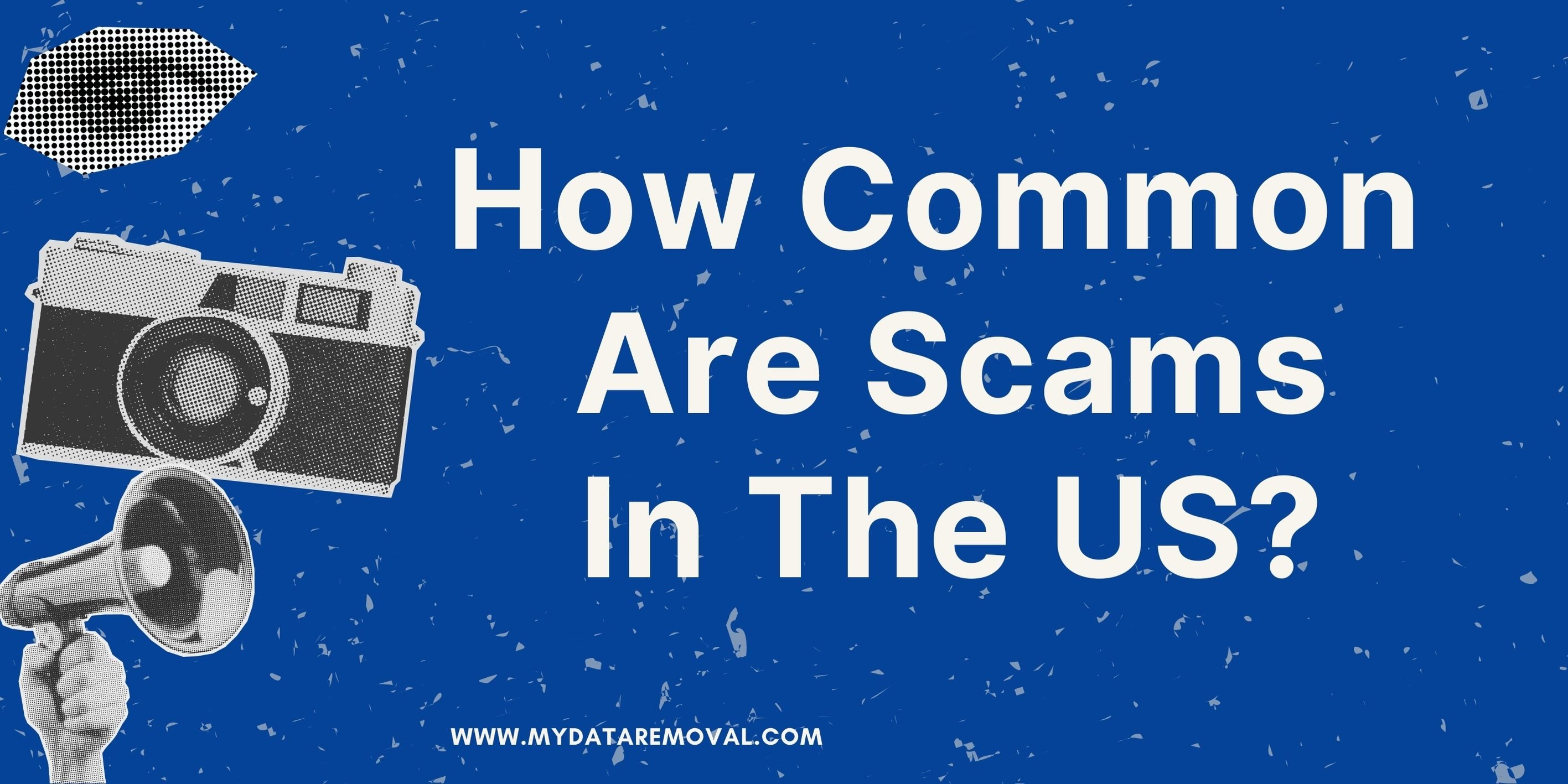Imagine this: You're relaxing at home, holding a warm cup of coffee. Then, you get a text. It shows the State Department of Transportation. It says, “Click the link to fix an issue with your driver's license.” You panic because what if your license gets suspended? But don't click—it could be a scam.
The 5 latest scams in the US are brushing schemes, package QR code scams, fake Wisconsin DVM, Kansas DOT text scam, and lending union robocall.
Today, scammers are getting better at tricking people. They use new technology (e.g., AI and deepfakes) and impersonation tricks. They'll find a way no matter how savvy you are. They even impersonate the people you trust and the authorities.
How Common Are Scams in the US?

Scams are very common in the US. According to data from 2020 to 2025, 80 million Americans have already lost money to scams. Plus, most of the victims are adults.
Based on data from the FBI and the FTC, the states with the most cybercrime losses are:
- Nevada: $96.29 average loss per resident.
- California: $89.79 average loss per resident.
- Arizona: $74.40 average loss per resident.
- New Jersey: $72.93 average loss per resident.
- Maryland: $61.59 average loss per resident.
Keep in mind that those are just the reported cases. Other victims don’t report, either because they're embarrassed or because they don't see the need to report. This means there could be more than 80 million scam victims in the US.
5 Latest Scams Targeting Americans
Now, here are five of the recent, rising scams that are going around in the United States:
1) Brushing Scam

Receiving a package you didn’t order is great. I mean, who would pass on free stuff? It could be random electronics, beauty products, or even just earbuds—and you would still take it because it's free.
But not everything free is good; that's because scammers are now also sending free packages. It may seem harmless, but what's really happening is they're using your name and address to create fake buyer accounts. Then, they'll make reviews on their products to boost their visibility and make their products more appealing to buyers.
While you won't lose money from this, it can negatively affect your identity and digital footprint. For example, when people discover that the item they bought is a scam and they see a positive comment in your name, buyers could blame you.
Additionally, the fact that they were able to ship a product to you means they have access to your personal information.
One way scammers get your information is through people search websites like TruthFinder. These sites list your information, including social media profile, location history, online activity, phone numbers, even criminal records, and more. With these bits of information, scammers can trick you with highly personalized attacks.
The USPS recently warned Americans of this new scam. The warning was also part of a larger initiative called “Project Safe Delivery,” which was launched by the USPS in 2023 to stop mail scams.
2) Package QR Code Scam

This recent scam is also related to packages.
Scammers will send you free packages with QR codes on them. You'll be instructed to scan the code either to “leave a review” or “receive a discount on your next order.” But when you scan, your device will be infected with malware, allowing scammers to scan for your information or access your accounts. Other times, the code leads to a fake website, designed to trick you into sharing your information.
In some cases, scammers send emails or messages with QR codes after you receive an item you ordered from a legitimate seller. They'll pretend to be that seller, tricking you into scanning the code.
The FBI has already issued warnings about this scam, saying that while the scam is not yet widespread compared to other schemes, the public should still be aware.
3) Fake Wisconsin Division of Motor Vehicles Scam

This recent scam is targeted at Wisconsin residents.
Scammers pose as people from the Wisconsin Division of Motor Vehicles (DMV), and then send fake texts and emails. The message is about a “final notice” for “unpaid traffic violation,” urging you to send information or click a malicious link.
The message looks convincing from the Wisconsin Department of Transportation (DOT). However, the department made it clear that the messages are fake.
This scam has also hit residents in:
- New York
- New Jersey
- Georgia
- Pennsylvania
- Illinois
- Florida
The DMV said that a message is fake if you didn't sign up to receive messages from the division. If you've fallen victim to this scam, the DMV recommends filing a report with the local police, FTC, and the FBI’s IC3.
4) Kansas DOT Text Scam

This is similar to the Wisconsin DMV scam.
There have been reports from Kansas drivers receiving messages from the Kansas Department of Transportation. The message is a notice for unpaid traffic tickets, and claims enforcement is near. The goal is to trick you into paying or sharing your information.
The Kansas Department of Transportation said it's not collecting money or information over the phone. The department also advises against clicking links to keep your information safe.
5) Lending Union West Coast Robocall

Our recent scam targeting Americans is a fake Lending Union robocall.
Scammers send robocalls claiming to be from the West Coast branch of Lending Union. The call is about your “loan application” that needs verification and requirements, like more personal information.
You'll know it's a scam if you didn't apply for a loan, but they still called you.
If you receive this robocall, don't be tempted to respond. Don't press any number or call back. This is because the moment you respond, it confirms that your number is working. This means scammers will keep on calling you.
To stop robocalls, you can call your phone company to ask for call-blocking tools you can use. Plus, try registering your number on the Do Not Call List. This will help you stop telemarketing calls.
5 Ways to Avoid Being Scammed

1) Don't Trust, and Always Verify
One way you can avoid being scammed is by adopting the Zero Trust and Always Verify approach. This simply means don't trust anything and always. For example, did you receive a message? See it as untrustworthy. Then, verify if it's legitimate.
This is a simple approach, but it will help you effectively avoid getting scammed.
2) Avoid Clicking Links and Attachments
As you've learned from the five scams we talked about, scammers often leave attachments or links. If you click them, your device will be infected with a virus, or you'll be directed to a fake website.
Instead of clicking links, go to the real website by searching for it online.
3) Use Virus Protection for Computers
It's also important to keep your devices protected. You can do this by using virus protection software, which will keep your computer and information protected from malware. Some software also comes with privacy features like phishing detection.
4) Use Different Passwords
You can also protect yourself by using different passwords for your accounts. That's because using only one password makes you an easy target. Once scammers get hold of your password, they'll be able to access all of your accounts.
Using a password manager is highly recommended. It will generate and store strong, unique passwords for every account you have.
5) Protect Personal Information
Lastly, you can avoid scams by making sure scammers don't have access to your information.
Remember: scammers can find your information online through a simple search on social media or people search websites. To protect your information, you should keep your online accounts private, limit what you share online, and opt out of people search websites.
Conclusion
In summary, while today's scammers are getting better at tricking Americans, you can still outsmart them by staying updated. Learn their new tactics and the ways you can protect yourself.
Frequently Asked Questions
How to know if you're chatting with scammers?
You’ll know they're scammers if they can't answer personal questions and if they avoid having a video chat with you. They don't want you to verify their identities, so they won't give you more specific details about their lives. They also can't show you their real face through a video chat.
What are the top scams in the US?
According to the FBI, the most common scams in the US include 1) the Nigerian letter or 419 scam, 2) advance fee schemes, 3) telemarketing fraud, 4) pyramid schemes, and 5) Ponzi schemes. If you've been scammed, report to the FBI’s Internet Crime Complaint Center.



